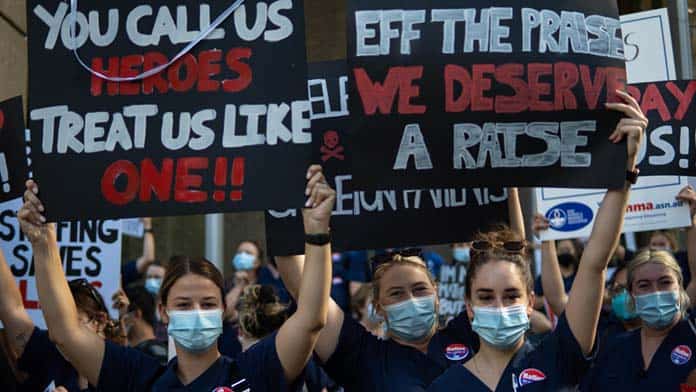Anthony Albanese is trying to present the appearance of change, announcing steps towards a referendum on an Indigenous voice to parliament, and celebrating the support for Labor’s climate bill in parliament.
But beyond the symbolism, Labor is refusing to budge from the conservative, small target policies it took to the election or offer anything substantial.
Workers are facing a major hit to living standards as the cost of living soars. Treasurer Jim Chalmers has admitted inflation is likely to rise further to hit 7.75 per cent by the end of this year, and still be around 6 per cent in a year’s time. This has already produced a 3 per cent drop in real wages this year, with worse to come.
Wages will continue to drop in real terms for another year and a half, according to the Reserve Bank, back to the levels of 2010.
Yet despite its attack on the way “everything is going up except your wages” during the election, Labor is now refusing to do anything about it. Chalmers has simply washed his hands, saying “every household has to make tough decisions”.
The new government is trying to blame the legacy of the Coalition for its own inaction.
As the ACTU points out, the wages share of the economy is at its lowest level since records began in the 1960s. But instead of a focus on wages or delivering workers a bigger share amid surging business profits, the new government’s Jobs Summit in September is focused on boosting productivity and delivering even more for the bosses.
The money to fix childcare, hospitals and ease the squeeze on living standards is there.
The government has come under growing pressure to scrap the appalling “stage three” tax cuts for the rich it backed in opposition. The $17.7 billion in the first year alone in 2023-24 goes overwhelmingly to the rich, with almost 80 per cent of benefits for the top 20 per cent of income earners. Chalmers has dismissed the idea of scrapping them, reaffirming that Labor wants, “to leave them in place.”
Labor is also committed to ramping up military spending including $270 billion on weapons over the next decade, announcing a new Defence Strategic Review to decide on the purchases. The nuclear submarines will cost another $170 billion on top. Labor is backing the same aggressive military build up against China as the Coalition.
Climate deal
The Greens’ decision to back Labor’s climate targets shows that negotiations in parliament will do little to force more serious change. Despite The Greens’ efforts to improve the bill, Labor refused to accept any serious changes. The target of 43 per cent reduction is nowhere near what’s needed. Labor refuses to put a stop to further coal and gas projects, threatening to cancel out much of its emissions cuts.
And instead of taking action to bring the power industry back under public control, it wants to allow the private sector to build and own all the new renewable power generation. Energy Minister Chris Bowen even declared that Labor’s policies mean “Australia is open for business”.
But insisting that climate action can only happen if it’s profitable won’t deliver the urgent action needed. Nor will it deliver the well-paid jobs needed to look after workers moving out of the fossil fuel industry.
It is going to take action on the streets and in the workplaces to win the change that’s needed. We need more strikes to boost wages and deal with the cost of living crisis.
NSW nurses are showing the way, voting to keep fighting for a 7 per cent pay rise even against the efforts of their union leaders. A further strike is being planned for 1 September, but rank and file nurses need to build pressure within the union to step up the fight.
Public sector unions in WA are also fighting their state Labor government for at least a 5 per cent pay rise, after an offer of 3 per cent plus a one-off $2500 bonus.
The NTEU at Sydney Uni has taken another 24 hour strike, its fourth day of strike action since May, demanding an above inflation pay rise and a reduction in casualisation. Rail workers in NSW are also staging more industrial action for a legal guarantee of safety on new intercity trains and pay.
We also need a much stronger climate movement. While hundreds have joined initial climate protests since the election, 40 per cent of the population think Labor’s target is not enough, according to Essential poll. That is more than three times the number who voted for The Greens. Many more people can be won to joining the protests needed to avoid climate catastrophe.
The Greens should be throwing themselves into building protests and campaigning, instead of simply focusing on discussions in parliament.
Actions in November around the COP27 climate summit, which Albanese is likely to attend, will be an important focus.
It is struggle outside parliament that’s needed to force Labor to deliver change over workers’ rights, the cost of living and climate action.





